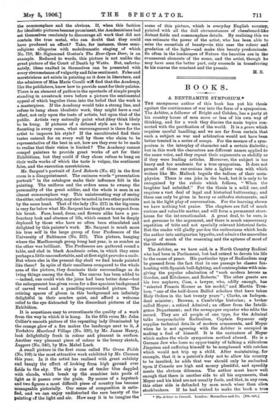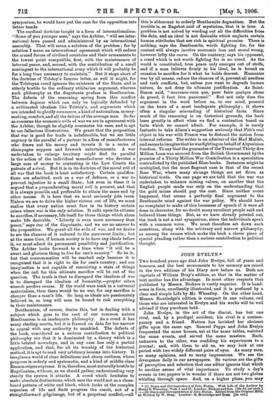BOOKS.
A BENTHAMITE SYMPOSIUM.*
THE anonymous author of this book has put his thesis against the continuance of war into the form of a symposium. The Arbiter, a follower of Bright and Cobden, has a party at his country house of men more or less of his own way of thinking, and for a week they discuss the main topics con- nected with the pacification of the world. It is a genre which requires careful handling, and we are far from certain that such a subject as war and arbitration would not have been better treated in a series of essays. For the essence of a sym- posium is the interplay of character and a certain dialectic ; but in this work the characters are different names applied to the same voice, and they repeat their arguments as stolidly as if they were leading articles. Moreover, the subject is too heavy and too academic for a true symposium. It does not permit of those exc ursions into a lighter vein with which writers like Mr. Mallock beguile the tedium of their meta- physics. There is one joke in the book, but it is only to be recognised by the rubric which follows, "When the laughter had subsided." For the thesis is a solid one, and requires a vast deal of legal and historical buttressing; and these can only be given in heavy ex cathedra statements, and not in the light play of conversation. For the learning shown we have nothing but praise. The chapters are full of much curious and valuable matter, and will form a permanent store- house for the int ernationalist. A great deal, to be sure, is not germane to the argument, and there is much unnecessary repetition of trite and not specially relevant historical facts. But the reader will gladly par don the enthusiasm which leads the author into antiquarian bypaths, and admire the masculine vigour of much of the reasoning and the aptness of most of the illustrations.
The Arbiter, as we have said, is a North Country Radical who had been in Parliament, but had retired to devote his life to the cause of peace. His particular type of Radicalism may be guessed from the fact that in one passage he classes fox- hunting with Spanish bull-fighting, and contemplates with mis- giving the popular admiration of "such modern heroes as Gordon, and Kitchener, and Roberts." The other guests are his two nephews, Case, a lawyer, who, oddly enough, has selected Francis Horner as his model," and Martin True- love, "one of the half-dozen Balliol scholars that have taken Holy Orders in the last twenty years " ; Clarke, an Indepen- dent minister ; Browne, a Cambridge historian; a broker called Meyer ; a retired Admiral ; an officer from the Intelli- gence Department; and the newspaper reporter who edits the record. They are all people of one type, for the Admiral talks irreproachable Radicalism, Captain Seymour only supplies technical details of modern armaments, and Meyer when he is not agreeing with the Arbiter is occupied in making a fool of himself. It is the caricature of Meyer which makes the whole symposium method absurd. He is a German Jew who loses no opportunity of talking a ridiculous
Jingoism and suffering himself to be nonplussed with catches which would not trip up a child. After maintaining, for example, that it is a patriot's duty not to allow his country to be insulted, he adds that war should only be embarked upon if Consols are high and money plentiful, and speedily meets the obvious dilemma. The author must know well enough that there is another side to all his arguments, that Meyer and his kind are not usually fools, and that, in any case, this other side is defended by men much wiser than alien stockbrokers. If he had wished to make the book a true
* The Arbiter in Council. London: Macmillan and Co. 110s. net.]
symposium, he would have put the case for the opposition into better bands.
The cardinal doctrine taught is a form of internationalism. "Some of you younger men," says the Arbiter, "will see inter- national laws passed and administered by an international
assembly. That will mean a solution of the problem ; for by solution I mean an international agreement which will reduce the armed forces of civilised countries and their armaments to
the lowest point compatible, first, with the maintenance of internal peace, and, second, with the contribution of a small contingent to the international army which it will probably be for a long time necessary to maintain." But it stops short of the doctrine of Tolstoy's famous letter, as well it might, for the Tolstoyan creed ignores the existence of the State, and is utterly hostile to the ordinary utilitarian argument, whereas such philosophy as the disputants profess is Benthamism. The defects of the reasoning spring from this conflict between dogmas which can only be logically defended by a sublimated idealism like Tolstoy's, and arguments which are intended to glorify commerce, a kind of nationalism, money- making, comfort, and all the deities of the average man. So far as concerns the economic evils of war we are in agreement with the Arbiter, though he slightly overstates his case, and is apt to use fallacious illustrations. We grant that the proposition that war is good for trade is indefensible, but we see little cogency in the parallel of a partner in a firm of manufacturers who draws out his money and invests it in a series of champagne suppers and firework entertainments. A war undertaken to enlarge territory might find its parallel in the action of the individual manufacturer who devotes a large sum of money to contesting in the Law Courts the patents of a rival. But it is in its doctrine of the moral evil of all war that the book is least satisfactory. Certain qualifica- tions are admitted, such as a war of defence, or a war to prevent injustice to a small State; but even in these it is argued that a preponderating moral evil is present, and that it is always possible and preferable to attain the same end by other means. It is here that we most seriously join issue. Unless we are to drive the higher virtues out of life, we must realise that every nation must face in its history certain crises where war is the only solution. It calls upon its citizens to sacrifice, if necessary, life itself for those things which alone make life desirable. "Liberty is even more necessary than peace," says one of the disputants, and we see no answer to the proposition. We grant all the evils of war, and we desire to see the chances of it reduced to the narrowest limits ; but at the same time, if human society is to have any ideals before it, we must admit its permanent possibility and justification. The Arbiter looks forward to a time when "it will be a sweet and glorious thing to live for one's country." So be it; but that consummation will be reached only because it is recognised that it is right to die for one's country ; and our imagination is not capable of conceiving a state of things when the call for this ultimate sacrifice will be out of the question. The truth is that to disregard the idealism of war is to disregard the idealism of humanity,—propter vitam vivendi perdere causes. If the world were sunk in a universal materialism, then there would be no war, for any sacrifice is cheaper than a man's life. So long as ideals are passionately believed in, so long will men be bound to risk everything in their maintenance.
Benthamism, of course, denies this, but in dealing with a subject which goes to the root of our common nature Benthamism is an inadequate philosophy. As a creed it has many sterling merits, but it is framed on data far too narrow to appeal with any authority to mankind. The defects of the book, considered as a serious contribution to political philosophy are that it is dominated by a theory which is a little belated nowadays, and in any case has only a partial application, and that, for all its worship of the historical method, it is apt to read very arbitrary lessons into history. It imagines a world of clear definitions and sharp outlines, where progress is orderly and systematic, and a kind of middle-class Reason reigns supreme. It is, therefore, most naturally hostile to Hegelianism, without, as we should gather, understanding very -clearly the system it attacks. A creed which hesitates to make absolute distinctions, which sees the world not as a chess- board pattern of white and black, which looks at the complex organism of life and finds progress the result, not of a straightforward pilgrimage, but of a perpetual conflict,—all this is abhorrent to orderly Benthamite dogmatism. But the trouble is, as Bagehot said of mysticism, that it is true. A problem is not solved by weeding out all the difficulties from the data, and an ideal is not desirable which neglects certain human attributes that are rich in spiritual promise. There is nothing, says the Benthamite, worth fighting for, for the contest will always involve economic loss and moral wrong, however lofty the cause. On the contrary, says his opponent, a creed which is not worth fighting for is no creed. As the world is constituted, true peace only emerges out of strife, and if a man believes firmly in his ideal, he is bound on occasion to sacrifice for it what he holds dearest. Humanise war by all means, reduce the chances of it, prevent all needless and rash conflicts, but, unless you want to degrade human nature, do not deny its ultimate justification. As Saint- Simon said, " souvenez-vous que, pour faire quelque chose de grand, il faut etre passionne." But not only does the argument in the work before us, to our mind, proceed on the basis of a most inadequate philosophy ; it shows often a singular misreading of historical facts. Since much of the reasoning is on historical grounds, the book loses greatly in effect when we find a contention based on facts which we cannot admit. For example, it is surely fantastic to take Alison's suggestion seriously that Pitt's real object in his war with France was to distract the nation from internal reforms. The writer is an admirer of the Mad Mullah, and seems to imagine that he was fighting on behalf of Abyssinian freedom. To say that the guarantee of the Transvaal Thirty-five Million Loan was secured from the British Government by the promise of a Thirty Million War Contribution is a speculation contradicted by the published Blue-books. Instances might be multiplied, but the most flagrant case is that of the recent Boer War, where many strange things are set down as historical truth. On one page we are told that the war was undertaken to enhance mining values, on another that the English people made war only on the understanding that the gold mines should pay the cost. Since neither event happened, that seems a perfectly final argument to the Benthamite mind against the war policy. We should have no complaint to make of this looseness of speech if it were all done in character, for no doubt many excellent people said and believed these things. But, as we have already pointed out, the book is not a real symposium, since the individuals speak with a common voice. We must therefore set down such assertions, along with the arbitrary and narrow philosophy, as among the causes which make the book a clever piece of special pleading rather than a serious contribution to political thought.









































 Previous page
Previous page